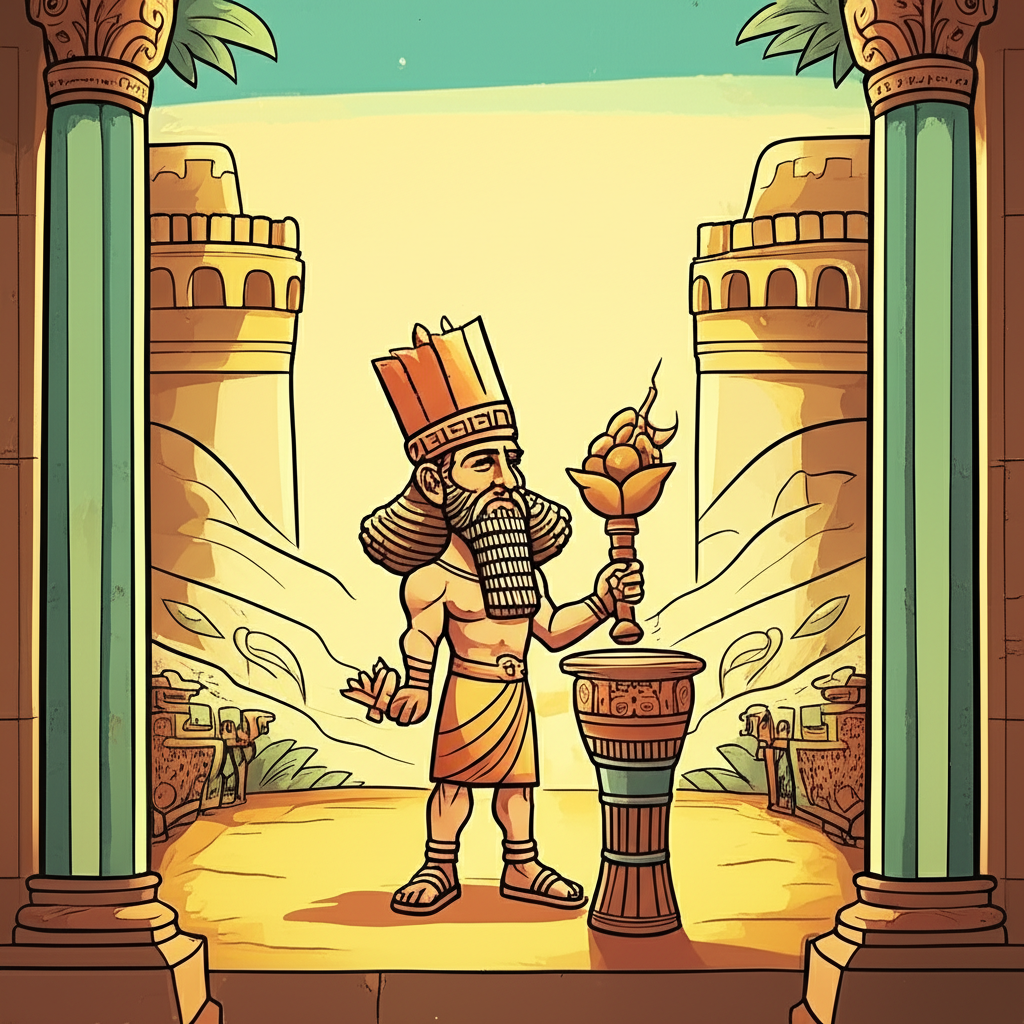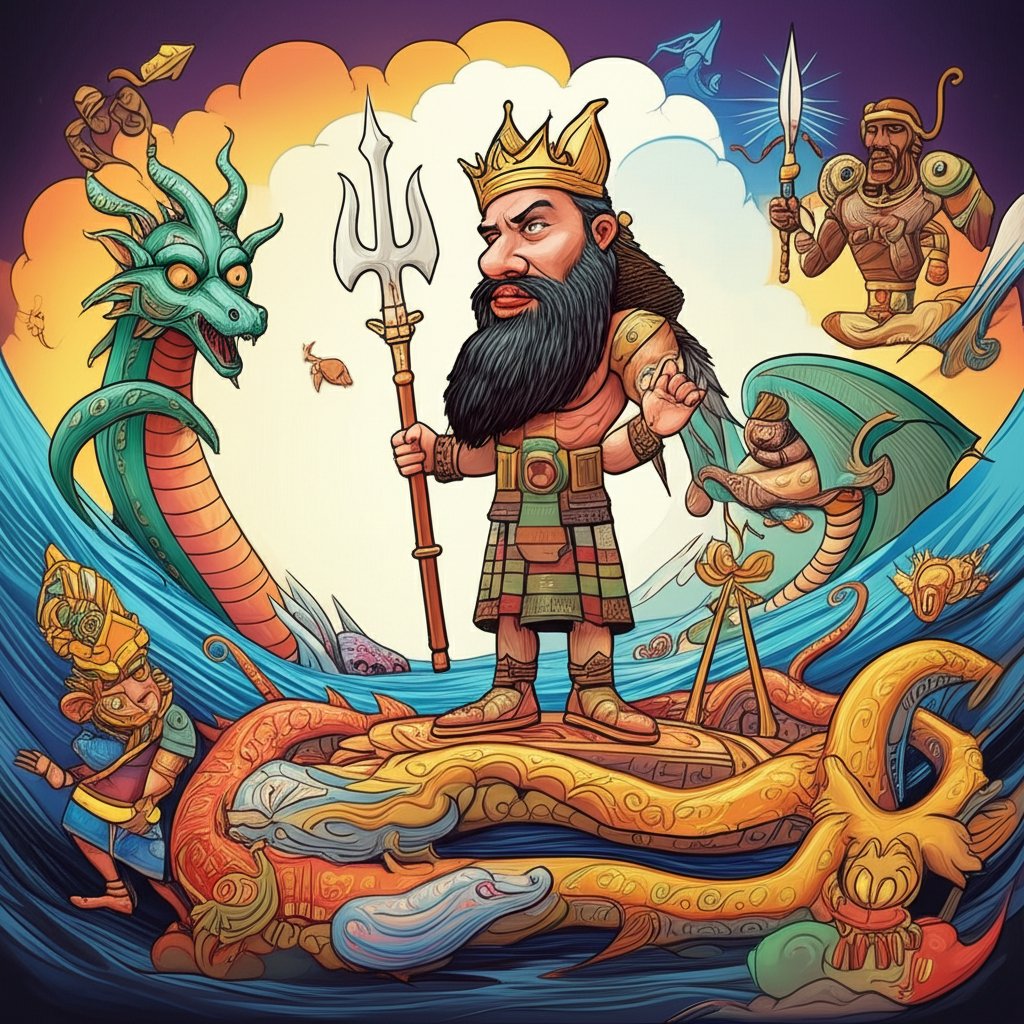
The tapestry of human history is interwoven with countless narratives, each thread a testament to the imagination and understanding of ancient peoples. Among these, few resonate with the enduring power of the Epic of Gilgamesh. Originating from the fertile crescent of ancient Mesopotamia, this profound narrative is a traditional story, not a factual account, told by the Sumerians and later the Akkadians, Babylonians, and Assyrians. It stands as one of the oldest surviving works of literature, a foundational epic that offers a window into the mind and spirit of a civilization that laid the groundwork for much of human culture.
Origins and Cultural Background: A World Shaped by Gods and Rivers
The Epic of Gilgamesh emerged from the vibrant and complex cultural milieu of Bronze Age Mesopotamia, a land cradled between the mighty Tigris and Euphrates rivers. This region, often called the "cradle of civilization," saw the rise of the world’s first cities, intricate writing systems, and sophisticated governance structures. For the people of this era, life was intimately intertwined with the natural world and the capricious will of a pantheon of gods. They viewed the world as a dynamic, often dangerous place, where floods could devastate cities, and droughts could bring famine.
In this polytheistic society, the gods were not distant observers but active participants in human affairs, capable of both immense creation and devastating destruction. Mortals were seen as subservient to these divine powers, their lives brief and ultimately subject to fate. The human struggle for survival, the desire for meaning, and the inevitable confrontation with mortality were central concerns. It was in this environment, amidst the grandeur of city-states like Uruk and the ever-present mystery of the divine, that tales of heroes and their quests for understanding were born and eagerly shared.
The Mortal and the Sage: Gilgamesh and Utnapishtim
At the heart of the Epic of Gilgamesh are figures whose symbolic attributes transcend mere characterization. Gilgamesh, the legendary king of Uruk, is depicted as two-thirds god and one-third human, a formidable ruler whose initial arrogance gives way to profound introspection. He symbolizes the duality of humanity—our immense strength and potential, yet our ultimate vulnerability and mortality. His quest is not merely for power, but for understanding, for a way to defy the fate that awaits all mortals. He embodies the human yearning for immortality and the struggle to come to terms with the finite nature of existence.
Crucial to Gilgamesh’s journey, especially in the context of the "aftermath of Eridu" (which here we interpret as the wisdom derived from the primeval world and the Great Flood), is Utnapishtim. He is the ancient, wise man, the sole human survivor of a devastating deluge sent by the gods, granted immortality for his role. Utnapishtim symbolizes ancient wisdom, the knowledge of the past, and the ultimate acceptance of life’s limitations. He is the keeper of a profound truth about human destiny, a living bridge to a world that existed before the catastrophic flood, a world that began with primeval cities like Eridu. His existence is a direct "aftermath" of that ancient world, and his wisdom is the fruit of its destruction and rebirth.
The Great Quest: Wisdom from the Deluge’s Survivor
The narrative section that most directly aligns with the "Aftermath of Eridu," understood as the legacy and wisdom of the primeval world and the Great Flood, begins after a pivotal tragedy in Gilgamesh’s life: the death of his beloved friend, Enkidu. Struck by the stark reality of mortality, Gilgamesh is plunged into a profound grief and a terrifying fear of his own inevitable end. His once boundless energy now channels into a desperate quest for eternal life. He resolves to seek out Utnapishtim, the only human granted immortality by the gods, a figure who resides at the ends of the earth, beyond the Waters of Death.
Gilgamesh’s journey is fraught with peril, a test of his resolve and a descent into the unknown. He traverses desolate plains, encounters terrifying scorpion-men guarding the mountains, and navigates twelve leagues of darkness. His path eventually leads him to Siduri, the divine cup-bearer, who advises him that his quest is futile, for death is the destiny of all humans. Yet, Gilgamesh persists, driven by his fear and his longing for understanding. He eventually crosses the perilous Waters of Death with the help of the ferryman Urshanabi, finally arriving at the distant shore where Utnapishtim dwells.
Upon meeting Utnapishtim, Gilgamesh recounts his suffering and his fervent desire to escape death. Utnapishtim, however, initially chastises him, reminding him of the cyclical nature of life and death, and that no human can escape their fate. It is then that Utnapishtim, at Gilgamesh’s insistence, reveals the ancient story of the Great Flood—a cataclysmic event sent by the gods to cleanse the world, a world that once included cities like Eridu, the first city, a symbol of civilization’s primeval dawn.
Utnapishtim recounts how the god Ea (Enki in Sumerian tradition, god of wisdom, often associated with Eridu) secretly warned him of the impending deluge and instructed him to build an enormous ark, saving his family, craftsmen, and all species of animals. For six days and six nights, the storm raged, submerging mountains and destroying all life outside the ark. When the waters receded, Utnapishtim released birds to find dry land, eventually landing on the peak of Mount Nisir. For his piety and obedience, and for preserving life, the gods granted him and his wife immortality, placing them in a distant land. This narrative, a profound account of destruction and preservation, is the "aftermath" of a world remade, a testament to both divine wrath and divine mercy, and the enduring wisdom of survival.
After sharing his story, Utnapishtim challenges Gilgamesh to stay awake for six days and seven nights, a seemingly simple task that would grant him immortality. But Gilgamesh, exhausted by his journey and overwhelmed by the truth of human frailty, succumbs to sleep. Upon waking, he is disheartened, realizing the futility of his quest for eternal life. Yet, Utnapishtim, seeing Gilgamesh’s despair, offers him a final gift: a thorny plant from the bottom of the sea that restores youth. Gilgamesh retrieves the plant, hoping to share its benefits with the elders of Uruk. However, on his journey home, while he rests, a serpent snatches the plant away, devouring it and shedding its skin, thus symbolizing renewal and the loss of Gilgamesh’s last hope for escaping natural aging.
Defeated but profoundly changed, Gilgamesh returns to Uruk. His quest for physical immortality has failed, but he has gained something far more enduring: wisdom. He now understands that true immortality lies not in escaping death, but in the legacy one leaves behind—the strength of his city, the stories of his deeds, and the enduring nature of human civilization. He looks upon the mighty walls of Uruk, built by his own hands, with a new sense of pride and acceptance.
Symbolism and Meaning: The Human Condition Unveiled
To the ancient Mesopotamians, the Epic of Gilgamesh served as far more than mere entertainment. It was a profound exploration of the human condition. The narrative of Gilgamesh’s journey and his encounter with Utnapishtim symbolized the inevitable confrontation with mortality that defines human existence. It highlighted the importance of friendship, as seen in his bond with Enkidu, and the devastating impact of loss.
The flood narrative, in particular, would have resonated deeply in a region prone to devastating river floods, serving as a powerful reminder of the gods’ power and the precariousness of life. Utnapishtim’s story represented not only survival but also the wisdom gained from profound experience—the acceptance of fate, the value of life, and the understanding that human greatness lies in building and enduring within one’s allotted time, rather than transcending it. Gilgamesh’s ultimate acceptance of his mortality and his return to Uruk to reign justly and build magnificent structures underscored the value of leadership, civic duty, and leaving a lasting legacy through one’s actions, not through an unending lifespan.
Modern Perspective: An Enduring Archetype
Today, the Epic of Gilgamesh continues to captivate and inform. It is celebrated in literature as one of the earliest examples of the "hero’s journey" archetype, a narrative pattern recognized by scholars like Joseph Campbell. Its themes of friendship, loss, the search for meaning, and the acceptance of mortality are universal and timeless, resonating across cultures and generations.
The epic is studied in universities worldwide for its historical, cultural, and literary significance. Its influence can be seen in countless modern stories, films, and video games that explore similar journeys of self-discovery and confrontation with the unknown. It offers a unique lens through which to understand ancient Mesopotamian civilization, their worldview, and their complex relationship with the divine and the natural world. Its enduring presence in academic and popular culture speaks to its power as a foundational text that explores the very essence of what it means to be human.
Conclusion: A Legacy of Imagination
The Epic of Gilgamesh, with its tales of gods, heroes, and devastating floods, is a precious artifact of human imagination and cultural heritage. It is a story, not a belief system, passed down through millennia, offering insights into the minds of those who walked the earth long before us. As Muslims, we recognize that only Allah is the true Creator and Sustainer of all existence, and that all power and knowledge ultimately reside with Him.
Yet, we can appreciate these ancient narratives for their cultural, historical, and educational value. The Epic of Gilgamesh reminds us of the universal human quest for meaning, the power of storytelling, and the enduring legacy of imagination. It stands as a testament to humanity’s innate desire to understand our place in the cosmos, to grapple with life’s profound questions, and to weave narratives that reflect our deepest hopes, fears, and aspirations.




